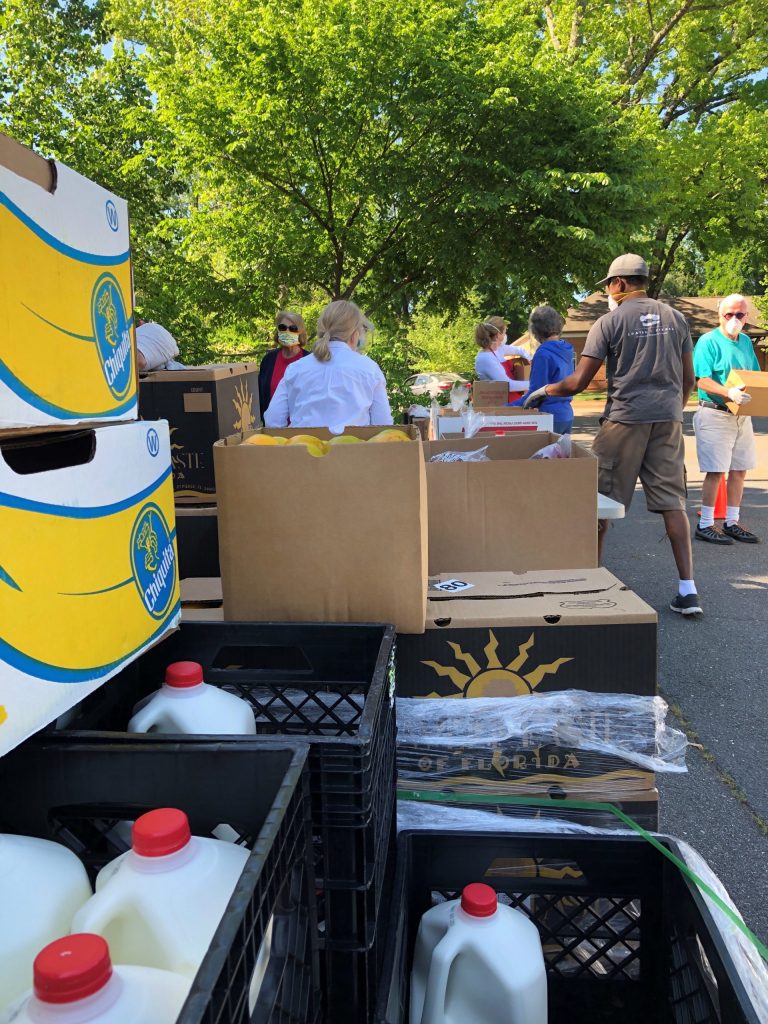Access to affordable, healthy foods is a challenge in many low-income communities, from large urban neighborhoods, to suburban and rural areas, as well as in communities of color. CDFIs have been working to create access to healthy foods and address food insecurity for decades. With the coronavirus pandemic impacting many families’ and individuals’ resources, businesses closing, and supply shortages, CDFIs can and are making a difference.
The impact of COVID-19 and food security is especially burdensome for families with young children. In a May 6th Brookings’ post, the author notes, “By the end of April, more than one in five households in the United States, and two in five households with mothers with children 12 and under, were food insecure. In almost one in five households of mothers with children age 12 and under, the children were experiencing food insecurity.” Further, compared to data from 2018, the author states that the incidence of food-related hardships is up 460 percent in that demographic. Other adult households are also experiencing double the rate of food insecurity as well.
One factor is affordability, which has been exacerbated by the pandemic, due to loss of jobs, which have hit low-wage workers particularly hard. Still, there are many for whom access to a grocery store is an issue, even if they could afford to purchase the nutritious, fresh foods that tend to cost more. Low-income and people of color are significantly more likely to live in communities without access to a supermarket, which can lead to or exacerbate poor health outcomes such as obesity, heart disease, and diabetes—all increase the risk for serious complications and death from COVID-19. Rural and tribal communities face a similar barrier, with many having to travel more than 10 miles to reach a grocery store.
The CDFI Fund’s CDFI Fund Programs, including the Healthy Food Financing Initiative and the New Markets Tax Credit, are very successful programs at Treasury utilized by many CDFIs to address this issue of food accessibility in low-income areas, rural towns, tribal areas, and communities of color, which are especially prone to poor access to healthy, affordable foods.
A great example of this work is Capital Impact Partners’ effort to launch the Michigan Good Food Fund (MGFF) in 2015 with a $3 million Financial Assistance award from the CDFI Fund and $25 million in private-sector investments. As part of this program, Capital Impact Partners provided a $5.5 million investment for Imperial Fresh Market on the west side of Detroit and serves a primarily low-income population. Approximately 70 percent of its customers use the Supplemental Nutrition Assistance Program (SNAP); approximately 90 percent are African American.
In emergencies, such as the pandemic, CDFI-financed projects like food banks and shelters are also helping vulnerable communities meet their nutritional needs. The Houston Food Bank is another example of a project that is currently helping people in Texas experiencing food insecurity and partnering with other nonprofits and companies to expand their reach during the pandemic. Using the NMTC, three CDFIs, including Community Reinvestment Fund, National Development Council, and LISC financed the rehabilitation and construction of the food bank’s warehouse and a freezer/distribution facility in 2010. The Houston Food Bank serves Houston and 18 surrounding counties in southeast Texas.
Self-Help, a Coalition member headquartered in North Carolina, is actively seeking out and assisting community food service organizations, such as food pantries and food advocacy/food justice organizations to help them obtain critical funding from the Paycheck Protection Program. This has ensured that these businesses have been able to retain or rehire laid-off staff to continue their important mission of delivering food or advocating for food justice in the many communities they represent. Loaves & Fishes, a network of emergency food pantries in Mecklenburg County, North Carolina, is one such organization.
The organization, which provides a week’s worth of groceries to people experiencing short-term economic hardships, had to pivot its operations practically overnight to serve thousands of families facing food insecurity as a result of the COVID-19 crisis. In addition to more need, Loaves & Fishes had to serve the community in a completely new way to keep everyone safe. This included service by all staff and less volunteers and transitioning from brick and mortar locations to mobile “drive through” locations.

One financial challenge Loaves & Fishes faced is that while the community has been overwhelmingly generous to make sure no neighbors in need go hungry, donors often restrict their contributions to food purchases and programs. The PPP loan provided peace of mind to ensure critical overhead expenses, such as staff payroll, could be met and their philanthropic support could be directly channeled into feeding programs.
“We were so relieved when Self-Help Credit Union reached out to offer assistance with the application and processing of a PPP loan,” noted Tina Postel, Executive Director of Loaves & Fishes. “Having banking experts assist with this process allowed us to focus more of our time, energy and talents on what we do best—feeding our neighbors in need.”
There are a lot of unknowns as communities nationwide grapple with the devastating health and economic impact of COVID-19. One thing is clear though, CDFIs have the experience and ability to help, but more federal investment is needed. As our blog post from Monday on Congress and COVID-19 appropriations outlined, the HEROES Act, which proposes $1 billion for CDFIs would be a significant step in helping low-income rural and urban communities that need resources the most.

Ayrianne Parks works with the CDFI Coalition and is the Director of Policy and Public Affairs at Rapoza Associates.
